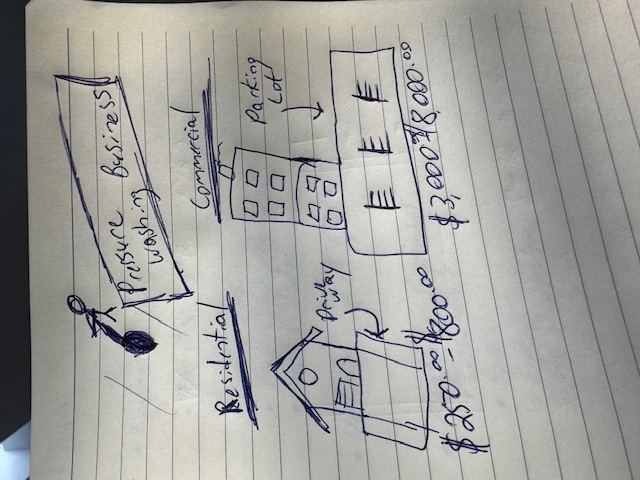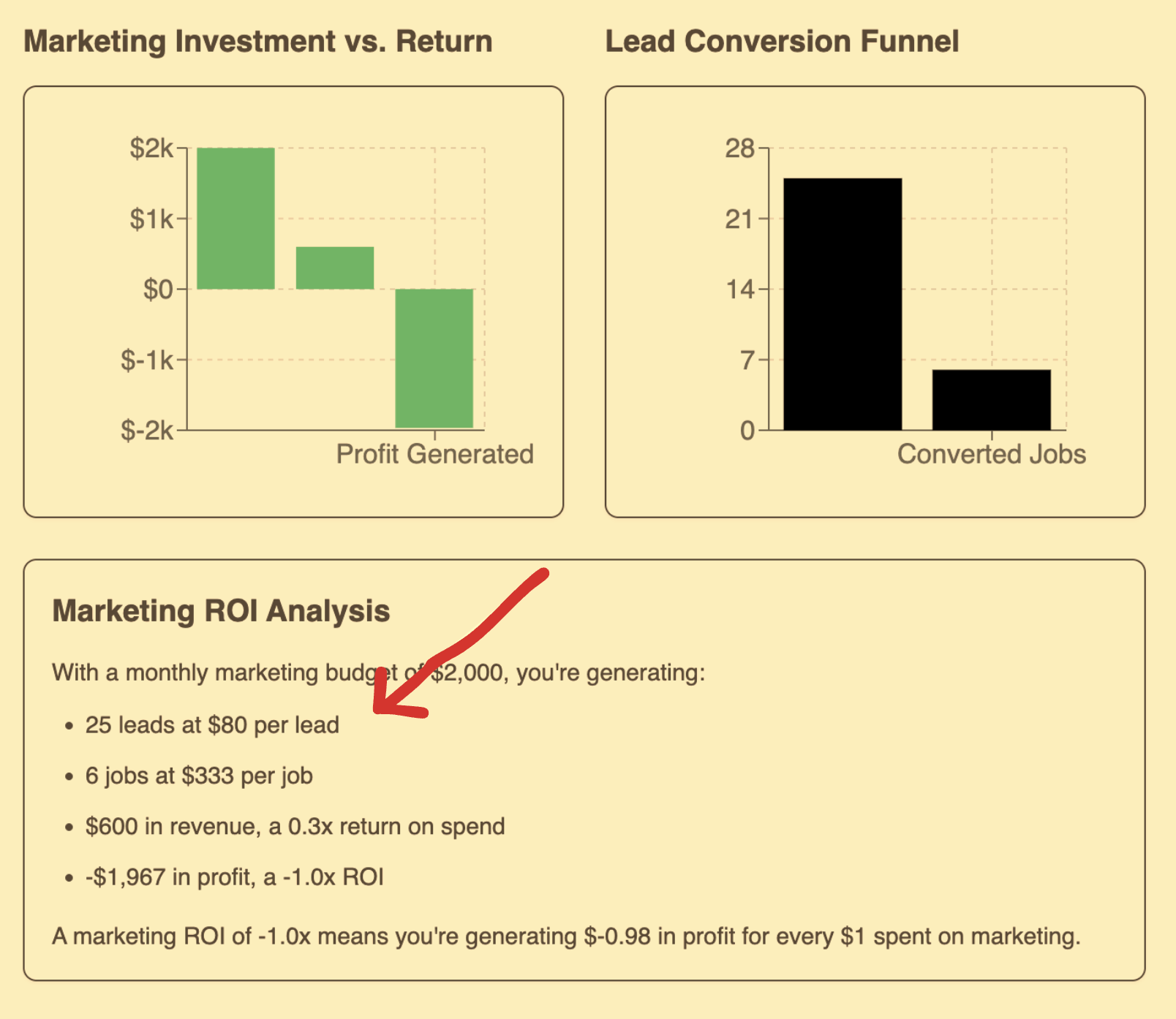Pressure Washing Business Calculator: Revenue & Profit Projections
Use this calculator to determine the starup costs, marketing efforts, and operational details of a pressure washing business.
How to Use the Pressure Washing Business Calculator
I built this pressure washing business calculator to help entrepreneurs evaluate the profit potential in this growing service industry that's projected to reach $3 billion in value by 2026. After researching market data and speaking with successful pressure washing business owners, I created this tool to give you realistic projections based on your specific costs, operational metrics, and pricing strategy. Unlike other tools, this calculator includes fields for marketing spend to attract new customers. This is an important expense often overlooked by first time business owners.
As Jason Geiman, the founder of King of Pressure Washing stresses, "The number one reason why people go out of business is financial management... they don't know their cash flow, they don't know their money in, money out." In fact, Jason estimates 44% of service businesses fail due to cash shortages and poor financial planning. And you do not want to become one of these cautionary tales.
Pressure Washing Business Industry Overview
The pressure washing industry allows you to build a business around residential and commercial property owners who recognize the value of a clean property. According to my research, startup costs can be surprisingly manageable. You could get started on a budget as low as $4,900 excluding a vehicle, or $14,900-$34,900 if you need to purchase a truck or van. Keep in mind you may need to upgrade equipment when you get more serious, but booking your first few jobs to test out the business model is possible on a budget.
The business model is straightforward: you invest in equipment, market your services, and perform pressure washing jobs for homes and businesses. The appeal lies in the relatively low barriers to entry, potential for high profit margins (some report 60-70% margins on premium services if you do the work yourself), and the ability to scale from a solo operation to a multi-crew business.

Pricing varies based on job type (house washing, roof washing, surface cleaning) and location, but my research indicates that residential services typically range from $150-$1,250 for house washing, $100-$350 for driveways, and $100-$500 for decks. Commercial services often command higher prices but may have slimmer margins due to competition.
Let's look at a real-world example from Julius Marchi, who co-founded Father N Son House Washing, who shared his results on social media:
In this example, the operator generated $1,800 in a single day with a one-truck, two-person crew. Another post from the same business owner reported monthly revenue of $45,269 with 59 jobs completed. While these represent the higher end of what's possible, they demonstrate the significant earning potential in this industry.
Step-by-Step Guide to Using the Calculator
Step 1: Enter Your Business Details
Start by entering your business name. This personalizes your results and helps with your business planning.
Step 2: Input Your Startup Costs
Enter your initial investment costs. The calculator provides default values based on industry averages and estimates provided at Jobber:
- Pressure Washer: $3,000 (professional-grade equipment)
- Vehicle Costs: $30,000 (if purchasing a new or used vehicle)
- Vehicle Wrap: $4,500 (for branding, though as Jason Geiman notes, "my trucks, I only had one truck wrapped out of the four..." - showing branding can be added incrementally)
- Branded Uniform: $200 (basic branding that enhances professionalism)
You can add more startup costs as needed or modify the defaults to match your situation. Remember, many successful businesses start with used equipment and scale up over time.
Step 3: Enter Annual Costs
Input your yearly recurring expenses. The calculator includes these essential costs:
- Business Insurance: $2,000 (Jason emphasizes, "one main important thing with business insurance make sure you ask the questions about what to do and also Auto commercial" - highlighting the critical nature of proper coverage).
- Software/Tools: $1,200 (CRM, accounting, and job management software).
- Licenses/Permits: $600 (varies by location).
Step 4: Add Monthly Variable Costs
Enter your recurring monthly expenses:
- Chemicals/Supplies: $250 (cleaning solutions and materials).
- Marketing Spend: $2,000 (Jason recommends, "If you want to make $100,000, that means you got to spend at least $10,000 in marketing" - suggesting approximately 10% of target revenue should go to marketing).
The marketing budget is particularly important, as Jason notes successful businesses use a mix of strategies: "I use yard signs, that's it... for neighborhoods" and "Google local ads have been amazing."
Step 5: Set Operational Metrics
This is where you define your business performance metrics:
- Leads per Month: 100 (phone calls, emails, website inquiries).
- Close Rate: 50% (Jason mentions this is a good benchmark, though he notes "It takes most people on average 11 times to close a deal" - emphasizing the importance of follow-up). Many owners will skip this step.
- Average Time per Job: 3-4 hours (varies by job type; Jason contrasts a "$1,500 residential job probably took three or four hours" versus a "McDonald's... $450... took them six hours or more with four guys.")
- Hourly Labor Cost: $30 (your time or employee costs).
- Average Job Price: $1,500 (industry prices range widely; successful operators prioritize high-margin jobs over volume).
Step 6: Calculate and Analyze Results
Click "Calculate Pressure Washing Business" to generate detailed projections including:
- Break-Even Analysis: When you'll recoup your initial investment.
- Profitability Metrics: Margins and net profit per job.
- Cash Flow Forecast: Monthly revenue and expense projections.
- Pricing Recommendations: Minimum, recommended, and premium pricing strategies.
- Marketing ROI: Lead costs and conversion values.
- Operational Efficiency: Job capacity and equipment ROI timeline.
The results help you avoid what Jason calls the biggest pricing mistake: "Everybody wants to compare to their competitors and price... the dude is going out of business because he don't know how to price." Instead, our calculator bases pricing recommendations on your actual costs and profit targets.

The Reality of Running a Pressure Washing Business
While the potential profits are attractive, it's important to understand the challenges of this business model.
Seasonality
Most pressure washing businesses experience significant seasonal fluctuations. In colder climates, winter months can see dramatic drops in demand. This means you need to either diversify your services (many add window cleaning, gutter cleaning, or holiday lighting) or prepare financially for slower periods.
Marketing Challenges
Consistent lead generation is crucial. As Jason notes, "If you put out 100 yard signs, you will get more calls... it's the part of being consistent." Our calculator helps you quantify marketing ROI and allocate your budget effectively across channels like yard signs, Google ads, and direct mail.
Job Volume Requirements
To achieve substantial revenue, you need a steady flow of jobs. If you charge $250 for a driveway cleaning, you'd need to complete 4 jobs daily to reach $1,000 in daily revenue. This requires efficient operations and effective marketing to maintain a consistent pipeline.
Physical Demands
Pressure washing is physically demanding work, especially in hot weather. This calculator factors in job duration and labor costs to help you plan your workload realistically and determine when it makes financial sense to hire help.
How the Pressure Washing Calculator Works
Here are the formulas I used to build this calculator.
Core Financial Calculations
| Metric | Formula | Example |
|---|---|---|
| Monthly Revenue | Jobs Per Month × Average Job Price | 50 jobs × $1,500 = $75,000 |
| Monthly Labor Cost | Jobs Per Month × Hours Per Job × Hourly Labor Rate | 50 jobs × 3 hours × $30 = $4,500 |
| Total Monthly Expenses | Monthly Variable Costs + (Annual Costs ÷ 12) + Monthly Labor Cost | $2,250 + $316.67 + $4,500 = $7,066.67 |
| Monthly Net Profit | Monthly Revenue - Total Monthly Expenses | $75,000 - $7,066.67 = $67,933.33 |
| Profit Per Job | Monthly Net Profit ÷ Jobs Per Month | $67,933.33 ÷ 50 = $1,358.67 |
| Profit Margin | (Profit Per Job ÷ Average Job Price) × 100 | ($1,358.67 ÷ $1,500) × 100 = 90.6% |
| Break-Even Jobs | Total Startup Costs ÷ Profit Per Job | $37,700 ÷ $1,358.67 = 27.7 jobs |
| Marketing Cost Per Lead | Monthly Marketing Cost ÷ Leads Per Month | $2,000 ÷ 100 = $20 per lead |
Pressure washing is one of those businesses that gained significant attention on social media. This is probably due to a combination of relatively low startup costs, high potential revenue (with some businesses claiming to make thousands per day), and the satisfying before-and-after video results you've seen scrolling through your feed.
While there are challenges to consider, the relatively low startup costs and potential for high profit margins make pressure washing an attractive option for blue-collar entrepreneurs.
But the thing I like most about this business model is the flexibility. You can start part-time with basic equipment and grow as you prove the concept. Many successful pressure washing entrepreneurs began with a single machine and gradually expanded their operations. As one business owner shared, "Don't turn something down... my goal is to help you grow, my goal is to make your life apart."
I suggest using this calculator to include in your business plan. Also, make sure to run multiple scenerios and figure out exactly how many leads you can realistically generate each month. Remember, a lot of the work isn't just completing the pressure washing. It's also about marketing to residential and higher-value commerical customers and locking in that business. This entire process takes more time and effort than it's often portrayed on social media.
